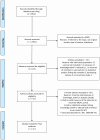Are healthcare workers' intentions to vaccinate related to their knowledge, beliefs and attitudes? A systematic review
- PMID: 23421987
- PMCID: PMC3602084
- DOI: 10.1186/1471-2458-13-154
Are healthcare workers' intentions to vaccinate related to their knowledge, beliefs and attitudes? A systematic review
Abstract
Background: The Summit of Independent European Vaccination Experts (SIEVE) recommended in 2007 that efforts be made to improve healthcare workers' knowledge and beliefs about vaccines, and their attitudes towards them, to increase vaccination coverage. The aim of the study was to compile and analyze the areas of disagreement in the existing evidence about the relationship between healthcare workers' knowledge, beliefs and attitudes about vaccines and their intentions to vaccinate the populations they serve.
Methods: We conducted a systematic search in four electronic databases for studies published in any of seven different languages between February 1998 and June 2009. We included studies conducted in developed countries that used statistical methods to relate or associate the variables included in our research question. Two independent reviewers verified that the studies met the inclusion criteria, assessed the quality of the studies and extracted their relevant characteristics. The data were descriptively analyzed.
Results: Of the 2354 references identified in the initial search, 15 studies met the inclusion criteria. The diversity in the study designs and in the methods used to measure the variables made it impossible to integrate the results, and each study had to be assessed individually. All the studies found an association in the direction postulated by the SIEVE experts: among healthcare workers, higher awareness, beliefs that are more aligned with scientific evidence and more favorable attitudes toward vaccination were associated with greater intentions to vaccinate. All the studies included were cross-sectional; thus, no causal relationship between the variables was established.
Conclusion: The results suggest that interventions aimed at improving healthcare workers' knowledge, beliefs and attitudes about vaccines should be encouraged, and their impact on vaccination coverage should be assessed.
Figures
Similar articles
-
Face-to-face interventions for informing or educating parents about early childhood vaccination.Cochrane Database Syst Rev. 2018 May 8;5(5):CD010038. doi: 10.1002/14651858.CD010038.pub3. Cochrane Database Syst Rev. 2018. PMID: 29736980 Free PMC article. Review.
-
Healthcare workers' knowledge, beliefs, and coverage regarding vaccinations in critical care units in Italy.Vaccine. 2019 Oct 31;37(46):6900-6906. doi: 10.1016/j.vaccine.2019.09.053. Epub 2019 Sep 26. Vaccine. 2019. PMID: 31564452
-
Knowledge, attitudes and beliefs regarding influenza vaccination among healthcare workers in a Saudi hospital.Vaccine. 2010 Jun 11;28(26):4283-7. doi: 10.1016/j.vaccine.2010.04.031. Epub 2010 May 2. Vaccine. 2010. PMID: 20441803
-
Sociocognitive predictors of the intention of healthcare workers to receive the influenza vaccine in Belgian, Dutch and German hospital settings.J Hosp Infect. 2015 Mar;89(3):202-9. doi: 10.1016/j.jhin.2014.11.009. Epub 2014 Dec 16. J Hosp Infect. 2015. PMID: 25586987
-
Midwives' attitudes, beliefs and concerns about childhood vaccination: A review of the global literature.Vaccine. 2018 Oct 22;36(44):6531-6539. doi: 10.1016/j.vaccine.2018.02.028. Epub 2018 Feb 23. Vaccine. 2018. PMID: 29483029 Review.
Cited by
-
Vascular endothelial injury assessed with functional techniques in systemic sclerosis patients with pulmonary arterial hypertension versus systemic sclerosis patients without pulmonary arterial hypertension: a systematic review and meta-analysis.Rheumatol Int. 2021 Jun;41(6):1045-1053. doi: 10.1007/s00296-021-04850-2. Epub 2021 Apr 8. Rheumatol Int. 2021. PMID: 33830321
-
The use of antidepressants is linked to bone loss: A systematic review and metanalysis.Orthop Rev (Pavia). 2022 Oct 13;14(6):38564. doi: 10.52965/001c.38564. eCollection 2022. Orthop Rev (Pavia). 2022. PMID: 36267210 Free PMC article.
-
Quality appraisal for systematic literature reviews of health state utility values: a descriptive analysis.BMC Med Res Methodol. 2022 Nov 25;22(1):303. doi: 10.1186/s12874-022-01784-6. BMC Med Res Methodol. 2022. PMID: 36434521 Free PMC article.
-
Examination of Nursing Staffs' Perceptions of the COVID-19 Vaccine Using the Health Belief Model.West J Nurs Res. 2024 Mar;46(3):229-235. doi: 10.1177/01939459241230383. Epub 2024 Feb 6. West J Nurs Res. 2024. PMID: 38318811 Free PMC article.
-
The risk of rheumatoid arthritis among patients with inflammatory bowel disease: a systematic review and meta-analysis.BMC Gastroenterol. 2020 Jun 17;20(1):192. doi: 10.1186/s12876-020-01339-3. BMC Gastroenterol. 2020. PMID: 32552882 Free PMC article.
References
-
- Centers for Disease Control and Prevention. Ten great public health achievements- United States 1900–1999. MMWR Morb Mortal Wkly Rep. 1999;48:1141–1147. - PubMed
-
- Barquet N, Domingo P. Smallpox. The triumph over the most terrible of the ministers of death. Ann Intern Med. 1997;127:635–642. - PubMed
-
- Muscat M, Bang H, Glismann S. Measles is still a cause for concern in Europe. Euro Surveill. 2008;13:pii=18837. - PubMed
-
- Van Treeck U. Measles outbreak in Germany: over 1000 cases now reported in Nordrhein Westfalen. Euro Surveill. 2006;11:pii=2955. - PubMed
Publication types
MeSH terms
LinkOut - more resources
Full Text Sources
Other Literature Sources
Medical
Miscellaneous


